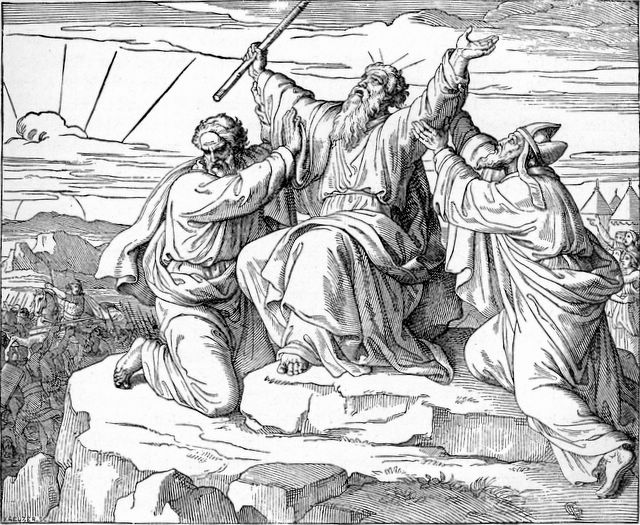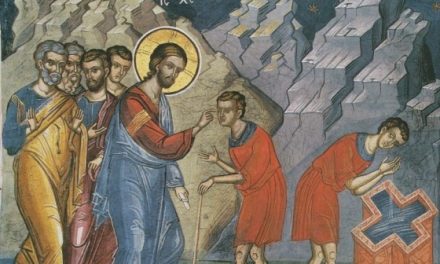Twenty-ninth Sunday in Ordinary Time
Ex 17:8-13; Ps 121:1-2,3-4,5-6, 7-8; 2 Tm 3:14-4:2; Lk 18:1-8
There is a seemingly endless array of quotes and motivational posters that praise the quality of persistence. We are told that a successful life is within reach as long as we remain firm and endure the times of difficulty. Persistence appears in all three of this Sunday’s readings, but it emerges as something more than mere motivational slogan. It is perhaps best understood through the lens of virtue.
In the First Reading, Moses must keep his hands raised up to maintain an advantage for the people of Israel as they battle Amalek. As he grows weary, a rock is positioned for Moses to sit upon, and Aaron and Hur stand on either side to help support his hands, keeping them steady till sunset. In the Second Reading, we are told to “be persistent whether it is convenient or inconvenient; convince, reprimand, encourage through all patience and teaching” (2 Tm 4:2). And in Luke’s Gospel, Jesus offers the parable of the widow who continually petitions the dishonest judge as a way to encourage his listeners to “pray always without becoming weary.”
It is tempting to laud persistence because is yields results, whether on the battlefield or in the courthouse. ut the point of persistence is not fundamentally about getting what you want (despite what the motivational posters might have us believe). Persistence is about being a certain sort of person, a certain sort of disciple, “whether it is convenient or inconvenient.”
Thomas Aquinas’s discussion of the virtue of perseverance (ST II-II.137) helps to illuminate this issue and offers three important reminders. Aquinas describes the virtue of perseverance as persisting in good for a long time. The first reminder, then, is that a virtue of persistence must be directed toward a good; it is not simply about keeping constant over time. No doubt there can be a kind of persistence found in the one who holds a grudge or the one who bullies. Yet, this persistence is not directed toward a good. So while we might marvel at their determination (and perhaps success), these persons are not exhibiting virtue. When the Second Reading tells us to “be persistent,” we have to take responsibility for the matter about which we are persisting. It seems significant that the widow of Jesus’s parable is asking for a “just decision” and not simply a decision in her favor.
Second, Aquinas discusses two vices opposed to perseverance (ST II-II.138). While we are accustomed to seeing fault in the one who gives up prematurely due to the difficulty of delay, we less often consider the fault of the one who is overly persistent. Aquinas calls this pertinacity and links it to being head-strong and self-opinionated. The danger is making a show of one’s persistence and being more committed to obstinacy than to the good itself. Thus, the imperative to “be persistent” comes in the context of remaining faithful to God and proclaiming the Good News. Our delight in remaining firm cannot eclipse our love of the Gospel.
Third, perseverance, as a part of the virtue of fortitude, regards our passions. In particular, it moderates the fear of weariness or failure. The threat of weariness appears not only in Jesus’s teaching to “pray always without becoming weary” but also in the image of Moses who tires with uplifted hands upon the hill. The scene of Moses sitting upon a rock with Aaron and Hur holding up an arm on either side is a surprising image of persistence, since Moses’s persistence comes with considerable help from others. It suggests that the virtue of perseverance is perhaps more of a social virtue than we might expect. In order to moderate the fear of weariness, we must recognize the community and the relationships that are by our side for support. And, of course, we must never fear to lean upon the rock that is God’s loving grace.
Thus, the persistence from this Sunday’s readings is not a strategy for personal accomplishment. It is a virtue that demands that we question whether our persistence is truly directed toward a good and whether we might mistakenly value our persistence over the good we seek. And it is a disposition that draws us to lean on God and others in overcoming our fear of tiring along the journey.






Trackbacks/Pingbacks